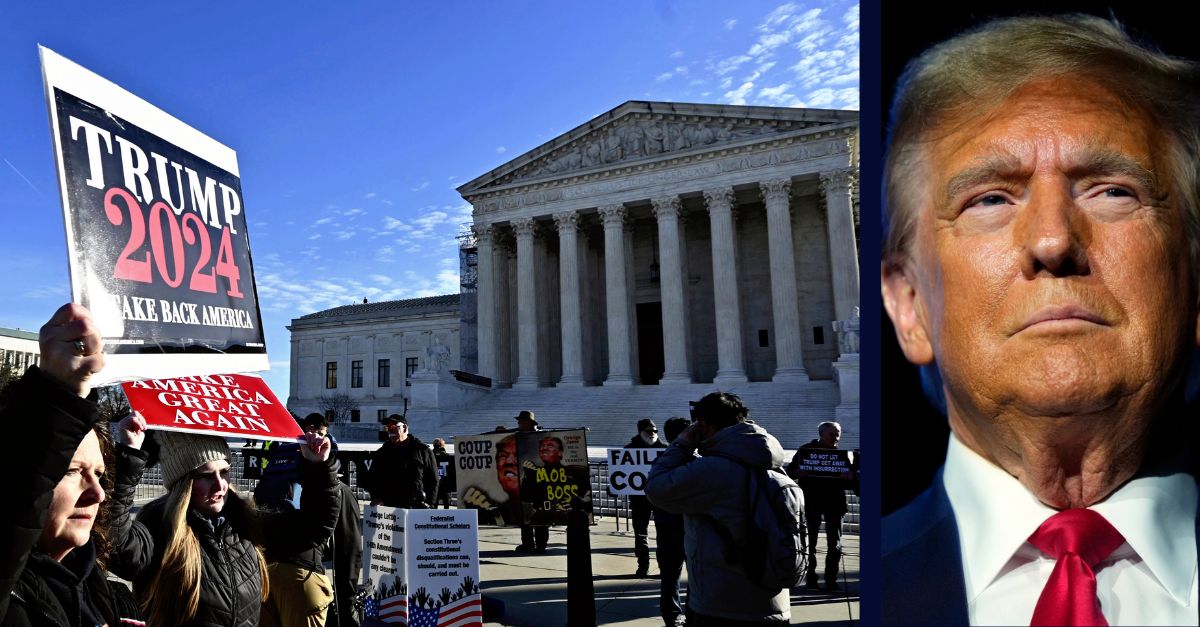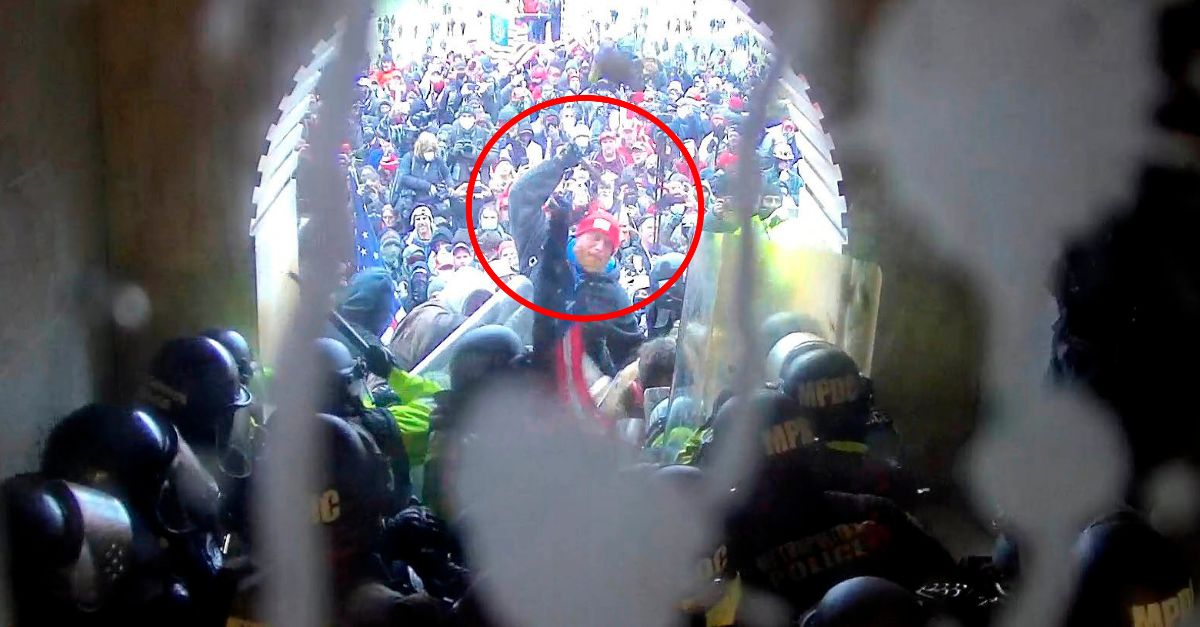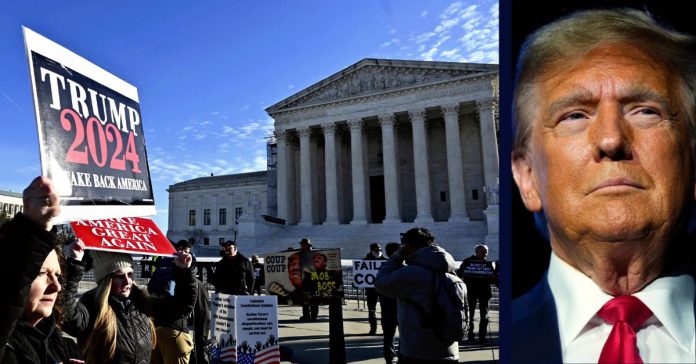
Left: People show their opinions in front of the U.S. Supreme Court in Washington on Feb. 8, 2024 (Yomiuri Shimbun via AP). Right: Republican presidential candidate former President Donald Trump speaks at the National Rifle Association’s Presidential Forum in Harrisburg, Pa., Friday, Feb. 9, 2024. (AP Photo/Matt Rourke)
The U.S. Supreme Court on Monday ruled in a per curiam opinion that Donald Trump will remain on the presidential primary ballot in Colorado, rejecting an attempt from voters to disqualify him and overruling a lower court’s finding that he was ineligible under the Constitution’s insurrection clause.
The decision comes as Colorado launches it primary along with 15 other states on Super Tuesday. Early voting has already been underway in Colorado, meaning the high court’s finding is a marked victory for Trump and his voters since he is considered the presumptive nominee for GOP in its bid to take back the White House.
The case of Trump v. Anderson is the first time in history that the Supreme Court has ruled on the application of Section III of the Constitution’s Fourteenth Amendment, or as it is more commonly known, the “insurrection clause.” The Civil War era provision bans people who vowed to uphold the Constitution but then betrayed it by “engaging in insurrection” from holding office.
The justices wrote that “because the Constitution makes Congress, rather than the States, responsible for enforcing Section 3 against federal officeholders and candidates,” they reversed the Colorado court’s finding that State Secretary Jena Griswold had the authority to remove him. The Colorado Supreme Court reversed a lower-court ruling keeping him on the ballot in part and affirmed in part, finding that the presidency is an office of the United States and the president its officer and that Griswold could remove him and discount any write-in ballots.
The relevant provision of the Constitution the Supreme Court justices said they relied on was Section V, which “enables Congress, subject of course to judicial review, to pass ‘appropriate legislation’ to ‘enforce’ the Fourteenth Amendment.”
“Or as Senator Howard put it at the time the Amendment was framed, Section 5 ‘casts upon Congress the responsibility of seeing to it, for the future, that all sections of the amendment are carried out in good faith,’” the majority opinion said.
Further, while states have the power to disqualify a person from holding office or attempting to hold state office, “states have no power under the Constitution to enforce Section 3 with respect to federal offices, especially the presidency.”
Voters represented by the federal watchdog group Citizens for Responsibility and Ethics in Washington (CREW) argued that Trump’s attempts to stay in office in 2020 by overturning his defeat to now-President Joe Biden through fraud and force were unconstitutional. A large number of historians also formally urged the court to uphold those findings as the case built momentum, noting even the president of the Confederacy Jefferson Davis acknowledged that the cost for insurrection was “automatic” disqualification from holding office in the United States.
In Monday’s per curiam opinion, Justice Amy Coney Barrett highlighted that while she agreed that states lack the power to enforce Section III against presidential candidates, she would “decide no more than that.”
“This suit was brought by Colorado voters under state law in state court. It does not require us to address the complicated question whether federal legislation is the exclusive vehicle through which Section 3 can be enforced,” Barrett wrote.
She continued:
The majority’s choice of a different path leaves the remaining Justices with a choice of how to respond. In my judgment, this is not the time to amplify disagreement with stridency. The Court has settled a politically charged issue in the volatile season of a Presidential election. Particularly in this circumstance, writings on the Court should turn the national temperature down, not up. For present purposes, our differences are far less important than our unanimity: All nine Justices agree on the outcome of this case. That is the message Americans should take home.
At oral arguments last month, justices seemed largely dubious over the prospect of booting the former president from Colorado’s primary ballot and roundly questioned how to balance the separation of powers between state and federal authorities. They mostly avoided addressing whether Trump had engaged in insurrection.
In Monday’s ruling, the justices wrote that Section III was “designed to help ensure an enduring Union” by preventing former Confederates from returning to power in the aftermath of the Civil War but that “section III works by imposing on certain individuals a preventive and severe penalty — disqualification from holding a wide array of offices rather than by granting rights to all.”
To allow Colorado to take a presidential candidate off the ballot under Section 3 would imperil the Framers’ vision of “a Federal Government directly responsible to the people” and it would create a chaotic “state-by-state patchwork at odds with our Nation’s federalism principles.”
“That is enough to resolve this case,” Justices Sonia Sotomayor, Elena Kagan and Kentanji Brown Jackson wrote in their concurring judgment.
But they clarified:
“Yet the majority goes further. Even though ‘[a]ll nine Members of the Court agree’ that this independent and sufficient rationale resolves this case, five justices go on. They decide novel constitutional questions to insulate this court and petitioner from from future controversy. ”
Sotomayor, Kagan and Brown continued:
They decide novel constitutional questions to insulate this Court and petitioner from future controversy. Although only an individual State’s action is at issue here, the majority opines on which federal actors can enforce Section 3, and how they must do so. The majority announces that a disqualification for insurrection can occur only when Congress enacts a particular kind of legislation pursuant to Section 5 of the Fourteenth Amendment. In doing so, the majority shuts the door on other potential means of federal enforcement. We cannot join an opinion that decides momentous and difficult issues unnecessarily, and we therefore concur only in the judgment.

In this image from U.S. Capitol Police security video, released and annotated by the Justice Department in the Statement of Facts supporting an arrest warrant, Shane Jenkins, circled in red, is seen holding an object near the Lower West Terrace tunnel at the U.S. Capitol on Jan. 6, 2021, in Washington. (Justice Department via AP)
The decision will have an imminent impact on ballots in other states where Trump’s constitutional eligibility has been successfully challenged. Only last week, a judge in Illinois removed Trump from the primary ballot there, acknowledging Colorado’s finding that he engaged in insurrection on Jan. 6. The Illinois judge also concluded Trump had “falsely swore … he was ‘legally qualified’ for the office he sought” under Section III.
Trump was disqualified too from the primary ballot in Maine. And, like in Illinois and Colorado, he appealed those decisions. Maine Secretary of State Shenna Bellows is expected act swiftly now that the Supreme Court has ruled; Trump’s disqualification in Maine was stayed by judge only until the high court ruled. Bellows fought the stay on appeal but that appeal was dismissed, The Associated Press reported.
Underlining the rarity of the question and the pressures of timing in the election season, it is worth noting that the court’s decision to release its opinion was swift. From the time the Colorado court issued its ruling in December to Trump’s appeal to the high court in the first days of January, less than a month had passed. The high court also waited less than a week to agree to hear the appeal and then set arguments for Feb. 8. Monday’s ruling comes less than month later, a fast pace for a court that overwhelmingly moves at a glacial pace.
Also notable: usually rulings will be read out from the bench by a single justice. Monday’s ruling was not; it was only posted on the court’s website.
This story is developing.
Have a tip we should know? [email protected]

